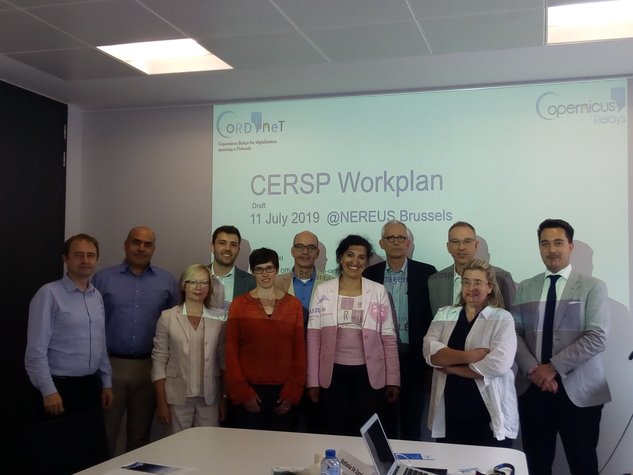
CERSP
Roadmap for digitalisation using Earth Observation data
CERSP has provided a final version of its roadmap for digitalisation using Earth Observation data identifying target groups and main policy objectives.
A final version of the CoRdiNet Short Roadmap to Digitalisation via Copernicus Earth Observation data, from the Copernicus European Regional Strategy Panel (CERSP), was recently provided. The panel consists of 18 representatives of the European Earth Observation community and was grouped into six working groups to set-up a road map adapted to the regional needs and offers in digitalisation via Copernicus Earth Observation data. The panel thinks that a regional-/sub-national view is closer to the needs and offers and allows to support business and pilot creation on a more effective and successful way compared to a national approach. Moreover, the regional/sub-national view allows for synergies with regional/sub-national funds and policy priorities. The final version of the roadmap includes identified target groups, main policy objectives, as well as a draft roadmap with regional and sub-regional committees. In addition, the roadmap has been through a consultation process with its primary stakeholders, the regional/sub-national policymakers in the regions in Europe, as described in Chapter 5. The feedback from the stakeholder group supported the CERSP in finalizing the roadmap.
Read the final version of the roadmap here.
Policy recommendations
This document has been initiated by the task group "Policy recommendations" of the "Copernicus European Regional Strategy Panel" (CERSP) gathering regional expertise in supporting Earth Observation-based business and services from all over Europe. The members' names and affiliations of CERSP task group is listed at the end of the document. The policy recommendations are directed toward two target groups able to play a direct role in digitalisation using Earth Observation data. These recommendations aim to better support Earth Observation, i.e. Copernicus-based services in Europe as seen from a regional perspective.
Working group for policy recommendations:
- Roya Ayazi, NEREUS-Association, Brussels, BE
- Lucio Bernardini, TeRN, Basilicata, IT
- Stefania De Zorzi, IEST, Venice, IT
- Marie Jagaille, Bretel, Brittany, FR
- Cristopher Oligschläger, EARSC, Brussels, BE
- Stéphane Ourevitch, SpaceTec Partners, Brussels, BE
- Julia Röhrig, DLR Space Management, Bonn, DE
- Henning Wehde, Institute of Marine Research, Bergen, NO
The policy recommendations can be downloaded here.
Guidelines for Copernicus Relays
This document has been initiated by the task group "Copernicus Relays Guidelines" of the "Copernicus European Regional Strategy Panel" (CERSP) to provide Copernicus Relays best practices and guide the optimization of Copernicus Relays activities and engagements at the local and regional level. In addition to providing a vision for all Copernicus Relays, the document lists skills needed by the Copernicus Relays, as well as activities tho be facilitated and offered, and lastly how to create synergies between Copernicus Relays and Copernicus Academy members.
The guidelines can be found here.
CERSP First meeting
After a Call for Expression of Interest published by CoRdiNet, eleven CERSP members met on Thu., 11 July to discuss a draft of the CERSP workplan.
Objective of the CERSP is to gather regional expertise in supporting Earth Observation-based business and services from all over Europe: It is the regions who have the direct links to the companies as well as to the local regional agencies, thus to both sides, the providers and users of EO services. Regions are different from each other: Be it mountainous areas or maritime coastal regions, vast forest lands or semi-arid landscapes, the ways of living of the local people are different, so are their requirements for business, safety, environmental protection, infrastructure maintenance or other administrative procedures, which might be satisfied by EO services. Also, the local political landscape and its public support programmes might be an important leverage for a European programme like Copernicus.
Thus, an exchange between the regional players, i.e. Copernicus Relays and clusters supporting space-related businesses in Europe and the European programme side of Copernicus should prove useful.
In order to discuss and stimulate better EO data usage, the CERSP will make suggestions for a road map and policy recommendations in order to better support EO, i.e. Copernicus-based services in Europe as seen from a regional perspective.
By invitation of Stefania De Zorzi, IEST, the next meeting of the panel will be at the IEST in Venice on 5 Nov. 2019 to discuss first inputs to the road map.
Here you find a list of the eighteen CERSP members and their affiliation in alphabetical order:
CERSP Full members
Roya Ayazi, NEREUS-Association, Brussels, BE
Lucio Bernardini, TeRN, Basilicata, IT
Marie Jagaille, Bretel, Brittany, FR
Stefan Lang, Univ. Salzburg, Salzburg, AT
Francisco Macedo, Government of the Azores, Azores, PT
Phil Monbet, Pôle Mer Bretagne Atlantique, Brittany, FR
Cristopher Oligschläger, EARSC, Brussels, BE
Stéphane Ourevitch, SpaceTec Partners, Brussels, BE
John Remedios, Univ. of Leicester, Leicester, UK
Benoit Rivollet, In Extenso Innovation Croissance, Auvergne Rhone-Alpes, FR
Julia Röhrig, DLR Space Management, Bonn, DE
Antonio Tabasco, GMV, Madrid, ES
Juergen Vogel, bavAIRia, Oberpfaffenhofen, DE
Henning Wehde, Institute of Marine Research, Bergen, NO
Stefania De Zorzi, IEST, Venice, IT
CERPS Observer members:
Tomas Dimitrov, MCI, Copernicus Support Office (CSO), Brussels, BE
Simon Jutz, esa, Frascati, IT
Julien Turpin, DG GROW, EC., Brussels, BE
